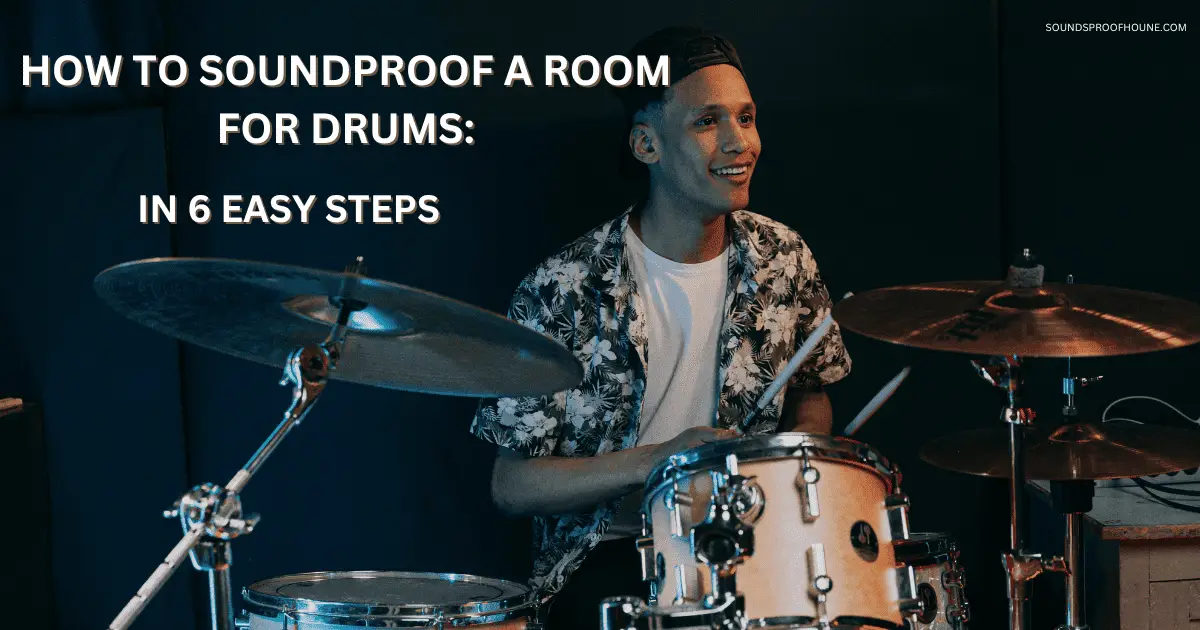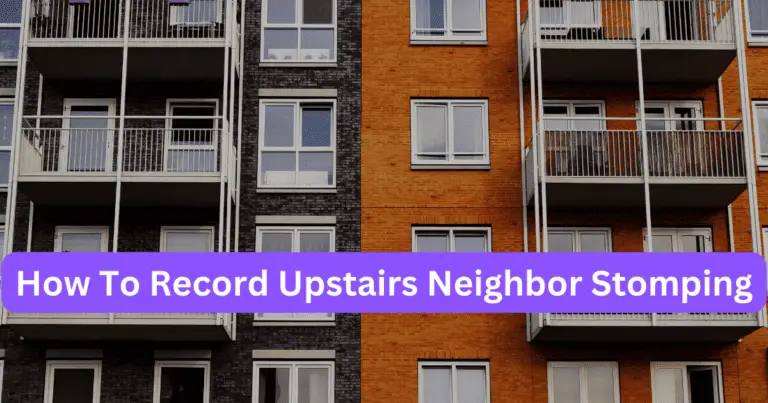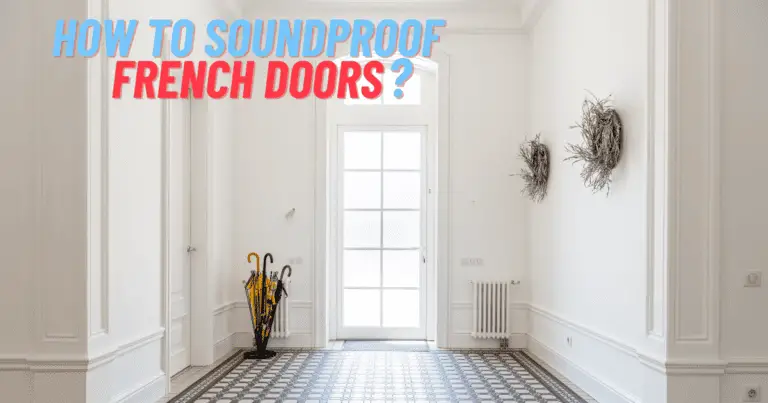How to Soundproof a Room for Drums: A Step-by-Step Guide

Drumming is an exhilarating and passionate musical expression. However, especially in residential regions or an apartment, their loud nature might frequently disturb your neighbors or other family members.
Soundproofing your drum room is crucial whether you’re a dedicated drummer trying to practice without disturbing others or a studio owner hoping to create the ideal recording environment.
This article will look at various methods and materials to assist you in how to soundproof a room for Drums and set up soundproofing that works so you can enjoy your drumming sessions without being concerned about noise.
So, Let’s get started.
Reasons Why You Need To Soundproof a drums room?
Although it might be a noisy activity, drumming is a fantastic way to release stress and express yourself. Soundproofing your drum room is the best option if you’re concerned about upsetting your family or neighbors.
Reducing the quantity of sound that enters or, leaves a room is the goal of soundproofing. We’ll walk you through the process of soundproofing your drum room in this article.
Understanding Soundproofing
Understanding how sound travels is crucial before you begin soundproofing. Waves of sound can pass through surfaces like walls, floors, and ceilings as well as through, the air.
Making a barrier that prevents sound waves from passing through is the process of soundproofing. This requires the use of heavy, dense materials like acoustic foam, soundproof drywall, and mass-loaded vinyl.
Assessing the Drum Room
It’s crucial to analyze your drum room to find any potential sound leakage locations and gauge its present sound insulation before beginning soundproofing procedures.
Search the space for openings or weak points where sound can enter or exit. These could be any openings that could jeopardize attempts at soundproofing, such as windows, doors, ventilation ducts, and so on.
Step By Step Process To Soundproof a drum room
Soundproofing a drum room in steps to minimize sound transmission and create an acoustically isolated space. To soundproof your drum room effectively, we will walk you through a step-by-step process.
1. Soundproofing the Walls
- Using Acoustic Panels or Foam
The use of acoustic panels or foam is one of the most efficient ways to lessen sound transmission.
These substances attenuate and absorb sound waves, preventing them from reverberating or leaking through the walls. Install the panels on the walls in a planned manner, paying attention to potential sound-escape points.
- Adding Mass-Loaded Vinyl (MLV)
Mass-loaded vinyl (MLV) is another alternative for soundproofing walls. MLV is a strong, flexible material that can be fastened to already-existing walls. It provides bulk and aids in reducing sound transmission through the walls.

2. Soundproofing the Ceiling
To soundproof the ceiling, you should add a layer of mass-loaded vinyl or soundproof drywall.
You can also add acoustic foam to the ceiling to absorb sound waves. Make sure to seal any gaps between the ceiling and the walls.
3. Soundproofing the Floor
Your drum room’s floor may serve as a substantial source of sound transmission.
To lessen vibration and noise from impacts, think about utilizing carpets, rugs, or mats. Floating flooring, which includes a raised platform with a layer of sound-dampening material underneath, can be added for improved soundproofing.
To lessen vibrations, rubber underlays can also be put underneath the drum set.

4. Adding Sound Absorption Materials
The drum room’s acoustics must be taken into account, even though soundproofing focuses on preventing sound from entering the room.
Echo can be lessened and the overall sound quality can be improved by adding sound-absorbing materials.
Bass traps, diffusers, and acoustic foam panels are frequently utilized to block out sound reflections and provide a more controlled setting for drumming.
5. Add density and close air gaps on the DOORS AND WINDOWS
Doors and windows are common weak points for sound leakage. To address this, consider using solid-core doors with weatherstripping to create a tight seal.

Install soundproofing curtains or double-glazed windows to minimize sound transmission through windows. Don’t forget to seal any gaps around the door frames and windows to further enhance soundproofing.
6. Sealing Air Leaks
Air leaks can significantly contribute to sound leakage in a room. Begin by identifying any gaps or cracks and sealing them with appropriate materials.
Weatherstripping doors and windows is crucial in preventing sound from escaping. Additionally, using door sweeps and draft stoppers can further seal off any gaps that might allow sound to travel.

Simple Tips for Soundproofing Your Drum Room
Think about the additional advice listed below to maximize the success of your soundproofing efforts:
1. Proper Drum Set Placement
To minimize sound reflections, place your drum set away from walls and corners. Find the sweet spot where sound is absorbed and confined within the room by experimenting with various positions.
2. Using Electronic Drums

If entirely soundproofing your drum room proves difficult, think about employing electronic drums.
They have the benefit of adjustable volume levels and headphone compatibility, allowing you to rehearse and perform while limiting the impact on other people.
3. Considering Room within a Room Construction
Building a room inside a room may be an option for individuals looking for the highest level of soundproofing.
This entails creating an enclosed area inside the current room that has its own walls, ceiling, and floor. A sound barrier is created by the space in the air between the two buildings.
4. Managing Ventilation and Air Circulation
Make sure the drum room has adequate ventilation and airflow without sacrificing soundproofing.
To preserve a comfortable environment, think about installing soundproof vents or employing air purifiers with low noise levels.
Use sound-absorbing materials
To effectively soundproof your drumming room, you’ll need specific materials designed to minimize sound transmission. Acoustic foam panels are a popular choice, as they absorb and dampen sound waves.
Soundproof curtains can also be used to cover windows or separate areas within the room.

Mass-loaded vinyl is an excellent option for blocking noise, and the green glue compound can be applied between layers of drywall for added soundproofing.
Building a Drum Isolation Room
For drummers who require maximum sound isolation, building a dedicated drum room or isolation booth is the ultimate solution.
This involves creating a separate room within a room, with specially designed walls, floors, and ceilings that provide superior soundproofing.
This ensures minimal noise leakage and allows you to drum freely without disturbing others.
Maintenance and Regular Checks
After soundproofing your drumming space, it’s crucial to perform routine inspections and maintenance.
Check for any fresh cracks or air leaks that may have appeared over time, and immediately seal them. To guarantee optimal operation, all worn-out soundproofing components should be replaced.
If you want to know more about Soundproofing then READ MORE
FAQ: How to Soundproof a Drum Room | Conclusion
Soundproofing a room for drummers is essential to enjoy drumming without causing disturbances.
By assessing the room, using appropriate soundproofing materials, sealing air leaks, and employing techniques specific to walls, floors, doors, windows, and ceilings, you can create a drumming environment that keeps noise contained.
Additionally, building an isolation room offers the highest level of soundproofing for dedicated drummers.
Remember to incorporate additional soundproofing tips and perform regular maintenance to preserve the effectiveness of the soundproofing measures.
Q1. Can I soundproof a room on a budget?
Ans: Yes, there are affordable soundproofing options, including DIY approaches and materials like weatherstripping curtains, and foam panels.
Q2. Does Soundproofing a Room for Drums Work?
Ans: Yes, soundproofing a room can effectively reduce the noise generated by drums using methods such as acoustic treatment, soundproofing insulation, and sealing air leaks.
Q3. Can soundproofing also improve acoustics?
Ans: Yes, soundproofing materials and techniques can improve the acoustics within a room.
They help reduce unwanted echoes and reverberations, enhancing the overall sound quality.





